
Impending Crisis: The Looming Threat of Climate Change on Global Crops
As global temperatures soar, a recent study from Aalto University warns us of the dire implications of climate change on agriculture. Research shows that crucial crops across the globe are at risk of diminished yields and growing disparity in food security due to the increased temperatures, particularly affecting crops near the equator.
Farmers like those in Rongai, Kenya, are already grappling with the escalating adversities from climate change; once flourishing fields are now plagued by erratic weather patterns and drastic climate shifts. The ramifications aren’t just limited to crop yield decreases but ripple through the fabric of society, affecting nutrition and food availability for vulnerable populations.
Understanding the Geography of Crop Vulnerability
The study identifies that the most vulnerable crops are primarily located in lower latitudes, which will face worsening conditions as climate changes exacerbate aridity. Under scenarios projecting temperature increases of up to four degrees Celsius, the safe climatic zones for many staple crops could shift significantly, threatening the livelihoods of millions. This shift amounts to a potential risk of losing up to half of these essential crops.
The Measurable Costs of Monoculture: Crop Diversity as a Lifeline
While the data from Aalto University paints a bleak picture, insights from additional sources like the Stanford Doerr School of Sustainability emphasize the necessity of crop diversity. Diverse agricultural systems, as opposed to monoculture, provide the resilience necessary to withstand climate shocks. For instance, under diversified farming practices, crops such as coffee thrive alongside bananas, sharing resources like shade to buffer against climate extremes. These integrated systems not only protect wildlife but also enhance food production stability amid unyielding climate changes.
Justice in the Climate Crisis: The Disproportionate Impact on Developing Nations
As countries at lower latitudes—often poorer and less resilient—bear the brunt of climate change, ethical considerations arise. Sara Heikonen from Aalto University asserts that those least responsible for the emissions causing climate change are the first to face its repercussions. With rapid population growth in regions like Sub-Saharan Africa and South Asia, the stakes for food security are higher than ever.
Action Steps: Cultivating Resilience in Agriculture
The urgent call to action is clear: we must invest in sustainable agricultural practices and crop diversity to buffer the impending threats posed by climate change. By emphasizing varied planting strategies and supporting traditional crop varieties, we could mitigate future crises and build healthier food systems that are more resistant to climatic fluctuations.
As we navigate this dynamic landscape, it is essential for communities, policy-makers, and individuals alike to understand and participate in implementing solutions that can create robust and resilient agricultural practices. Recognizing the interconnectedness of food security, health, and climate resilience is not just beneficial—it’s imperative for the survival of future generations.
 Add Row
Add Row  Add
Add 




Write A Comment